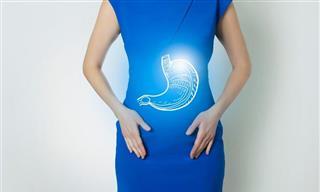The Causes of Stomach Bloating
Stomach bloating can be caused by quite a number of different things.
Signs & Symptoms
There are quite a few symptoms that often accompany feeling bloated. If you find yourself experiencing any of the following symptoms, then there's a good chance that you're suffering from stomach bloating:
• Your stomach feels very full and tight.
• You are experiencing stomach pains.
• You are passing a lot of flatulence.
• You can't stop yourself from continually burping.
• You feel fatigued.
• You are experiencing nausea or vomiting.
• You have a fever.
• You hear gurgling or rumbling coming from inside your abdomen.
Treating Stomach Bloating
1. Massaging above the navel
This point helps reduce gas formation and relieve stomach cramps.
Here's How:
• Place 4 fingers horizontally above the navel and massage this area for 2 to 3 minutes clockwise and counterclockwise.
• If the massage was successful you should feel a sour taste in your mouth and salivation will increase.
2. Massaging close to the navel
This point will help eliminate water retention and relieve stomach pain.
Here's How:
• Locate the point which is situated at the height of the second finger, just above the navel.
• Press on the point and massage the area for two minutes clockwise and counterclockwise.
3. Massaging below the navel
Massaging this area will increase intestinal activity and remove heaviness within the stomach.
Here's How:
• Place four fingers under the navel, the point is located just under the little finger.
• Massage the point for 2 to 3 minutes clockwise and counterclockwise. If done correctly, bloating should be alleviated.
4. Drink a glass of warm lemon water every morning

Each morning drink a glass of lemon water 15-30 minutes before your first meal. Doing so will help normalize the secretion of gastric acid. Lemon water will also help relieve the symptoms of heartburn, as well as prevent belching and gas formation in the intestine.
Drinking warm water first thing in the morning can also help flush the digestive system and hydrate the body. Furthermore, there is evidence that drinking water with lemon first thing in the morning can help maintain a healthy weight.
5. Don't have milk or coffee for breakfast
As we get older, our body's ability to produce lactose decreases, primarily because we don't need milk anymore. As our body's ability to break down cow's milk becomes more difficult with age, we are likely to experience more bloating.
Opt for yogurt or kefir instead as they contain probiotics. This helps stomach bacteria in the digestive processes which causes a bloated belly.
6. Drink ginger tea throughout the day
7. Don’t eat your food so quickly
One of the most common reasons for bloating is eating or drinking too quickly or drinking during your meals. The drinks you take with your meal dilute the gastric acid and the concentration of enzymes responsible for digestion. As a result, the food takes longer to digest, enabling the fermentation process to begin. As a consequence, increased gas formation and bloating may occur.
Natural Diuretics to Add to Your Diet
There are few things in life as frustrating as a bloated belly when you’re working out and sticking to a healthy diet. Even though you might be doing all the right things, feeling the way you want to feel might be less about cutting things out and, well, adding things in. So, if you have already tried cutting out salt, gluten, and soda, and you still have a bloated stomach, you should try some of these doctor-recommended natural diuretics. They all help to boost gut health while getting rid of excess fluid.
1. Watermelon

There are few things as refreshing as a nice piece of ice-cold watermelon – and for good reason, since its 92% water. “Although this fruit does have a lot of natural sugar, it’s a healthy choice that stimulates urination with the nutrients it houses,” says NYC physical therapist Dr. Karena Wu. However, due to its high water content, watermelon works best eaten as it is; most juices and popsicles that you can find – even the so-called natural ones – will be full of added sugars.
2. Asparagus
Everyone knows that distinct smell your urine gets after consuming asparagus. It happens fast, which goes to show that this vegetable is a great diuretic. This odor is caused by a compound called mercaptan, which releases odorous byproducts when broken down by the digestive system.
3. Lemons
There’s a good reason why many wellness experts swear by starting their day off with a cup of hot water and a squeeze of lemon. Dr. Wu says that “not only are lemons fantastic for helping flush the system of excess water, but they are also known to help rid the body of toxins.”
4. Water

One of the most overlooked ways to fight fluid retention is by upping your water intake. Water helps to move things along and keeps the body hydrated. When our bodies are hydrated, they don’t need to hold onto excess fluid.
5. Cucumbers
Cucumbers are great to use as diuretics because they’re naturally hydrating. Dr. Wu says that “they quickly work to help shed the body of excess water since they contain a lot of vitamins and minerals, in addition to its high water content.”
6. Dandelion Leaves
These leaves contain minerals, vitamins, and other compounds that work to encourage healthy fluid levels and stimulate healthy urinary flow. These greens are quite bitter, so it’s best to pair them with something sweet like honey lemon dressing.
7. Celery
Nutritionists often recommend celery to those looking to lose weight because it’s low in calories, contains a lot of fiber, and has a high water content – which means your body will be efficiently flushed out. Better still, it’s a versatile vegetable that works just as well in a soup or dipped in some hummus.
8. Mint Tea
Mint is commonly added to salads, juices and smoothies that can be found at health food stores – and for good reason. The plant works to naturally treat fluid retention while boosting digestion. If you feel bloated after a big meal, pour hot water over some mint leaves and let it steep for 5-10 minutes.
9. Ginger
Ginger is one of the most powerful anti-inflammatories because it helps to flush out excess fluids. Simply add some to your tea or salad, or chop it up and use it in the dressing for whatever protein you’re cooking for dinner.
10. Peaches
Peaches can be a very effective diuretic when eaten as they are or added to smoothies and salads. If you find that you’re having issues going to the bathroom, eat a handful of peaches.
11. Pineapples
This yummy fruit is high in digestive enzymes and is a natural diuretic. They are a versatile diuretic as you can eat them as they are, juice them, or add to smoothies.
12. Kale
High in water and nutrients, kale helps to get rid of fluid retention. Kale can be added to soups, salads, smoothies, stir-fry dishes, or juiced.
How to Prevent Stomach Bloating
If you want to prevent your stomach from ever becoming bloated, then there are quite a few preventative measures you can adopt. The following have been found to be the most effective at keeping stomach bloating away:
• Not smoking.
• Avoiding the consumption of alcohol.
• Avoiding swallowing air while drinking or eating.
• Never eating more than your stomach can handle.
• Exercising on a regular basis.
• Adopting a healthy lifestyle.
• Avoiding food that can cause gas, such as artichokes, Brussels sprouts, and milk.
• Treating any constipation issues.
• Practicing yoga mudras that ease the digestive tract, such as the Vayu mudra.
Possible Side Effects
The majority of stomach bloating cases are rarely a cause for concern. However, there can sometimes be unpleasant side effects associated with stomach bloating, which may be signs of a serious underlying medical condition.
If you experience any of the following side effects while you've got a bloated stomach, then you should seek medical attention right away:
• Difficulty breathing
• Pressure or pain in the chest area
• Fever
• Dizziness
• Fatigue
• Rapid pulse
• Jaundice-like symptoms
• Severe abdominal pain
• Vomiting blood or a dark-colored liquid
 Go to BabaMail
Go to BabaMail






































